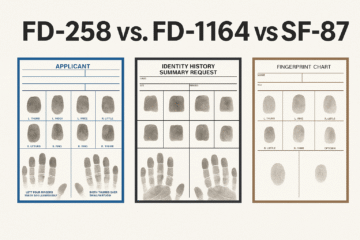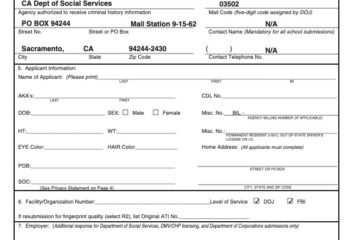Obtaining an FBI background check and apostille is crucial for individuals who need criminal history verification for travel, work, residency, or other international purposes. Many foreign governments require this document to assess a person’s legal record. The process involves obtaining a fingerprint-based background check from the FBI and then authenticating it for international use through an apostille or embassy legalization. Following the correct steps ensures the document is legally recognized in the destination country.
Understanding the FBI Background Check
An FBI background check, officially called an Identity History Summary Check, provides a record of an individual’s criminal history based on fingerprint submissions. It contains details of any arrests, charges, and convictions in the United States. If no criminal record exists, the report will state that the individual has a clean history. Many visa, work permit, and residency applications require this document as proof of good conduct.
Who Needs an FBI Background Check and Apostille?
Individuals applying for long-term visas, work permits, or residency in foreign countries often need an FBI background check. Certain professions, including teachers, healthcare workers, financial professionals, and government employees, require a clean criminal history before approval.
International adoption processes, marriage registration in some countries, and dual citizenship applications may also require a criminal history check. If the receiving country is part of the Hague Apostille Convention, an apostille is needed for authentication. Countries that are not part of the Hague Convention require embassy or consular legalization.
Step 1: Completing the FBI Background Check Application
The first step is submitting a request for an FBI background check. This can be done in two ways: directly through the FBI’s Criminal Justice Information Services (CJIS) Division or through an FBI-approved Channeler.
Applicants must complete an application form, which includes personal information such as full name, date of birth, address, and contact details. If submitting directly to the FBI, the standard form for fingerprint collection is the FD-258 Fingerprint Card.
Step 2: Getting Fingerprinted
The FBI requires fingerprint submissions to process a background check. Fingerprints must be captured properly to avoid rejection. There are two common methods of fingerprinting:
One option is traditional ink fingerprinting, where the applicant visits a police station or fingerprinting service provider to have their fingerprints taken on an official FD-258 card. The other option is live scan fingerprinting, which is available through FBI-approved Channelers and provides faster processing since fingerprints are electronically transmitted to the FBI.
Step 3: Submitting the Application to the FBI
After completing fingerprinting, the application must be submitted to the FBI. If applying directly to the FBI, the completed fingerprint card, application form, and payment must be sent to the FBI CJIS Division. Payments can be made via credit card, money order, or certified check.
If using an FBI-approved Channeler, the process is faster, as Channelers are authorized to electronically submit fingerprint data. This method significantly reduces processing time, with results available within 24 to 72 hours, compared to the two to four weeks required for direct FBI processing.
Step 4: Receiving the FBI Background Check Report
Once processed, the FBI background check report is sent to the applicant. If applying electronically, the applicant will receive a secure email link to download the report. If requesting a physical copy, the FBI will mail the document via the United States Postal Service.
It is recommended to request both electronic and hard copies to ensure backup in case of document loss or damage. Many international authorities prefer physical copies for official processing.
Step 5: Determining Apostille or Embassy Legalization Requirements
Before proceeding with authentication, it is necessary to determine the specific requirements of the destination country.
If the country is a member of the Hague Apostille Convention, an apostille is required. The U.S. Department of State in Washington, D.C., is the only authority authorized to issue apostilles for FBI background checks.
For non-Hague Convention countries, the document requires additional authentication steps, including certification by the U.S. Department of State followed by legalization at the destination country’s embassy or consulate.
Step 6: Obtaining an Apostille from the U.S. Department of State
To request an apostille, the original FBI background check report must be submitted to the Office of Authentications at the U.S. Department of State. The request must include the completed Apostille Request Form (DS-4194), along with the appropriate fee.
Processing times for apostilles vary but can take several weeks. If an apostille is needed urgently, expedited processing services through third-party agencies can help speed up the process.
Step 7: Embassy or Consular Legalization for Non-Hague Countries
For countries that do not accept apostilles, the embassy or consulate of the destination country must legalize the FBI background check. This process involves submitting the document to the U.S. Department of State for authentication, followed by further legalization at the relevant embassy or consulate.
Each embassy has specific requirements, such as additional forms, fees, or translated documents. It is important to check with the respective embassy for the latest legalization procedures.
Common Challenges and How to Avoid Delays
Processing delays often occur due to incomplete applications, incorrect fingerprint submissions, or missing documents. Ensuring fingerprints are properly captured by a professional fingerprinting service helps avoid rejection.
Timing is another challenge. Since an FBI background check and authentication process can take weeks or months, it is advisable to apply early. Using an FBI-approved Channeler and expedited apostille services can speed up processing.
Some countries require official translations of the FBI background check. If a translated copy is necessary, it should be completed by a certified translator recognized by the destination country’s authorities.
Final Steps Before Submitting to Foreign Authorities
Once the FBI background check has been authenticated, it is important to verify that all requirements have been met before submitting it to the foreign government, employer, or visa office. Some countries require the document to be used within three to six months of issuance.
Keeping multiple certified copies ensures that if one document is lost or delayed, another is available for submission.
Conclusion
Getting an FBI background check and apostille requires careful planning and attention to detail. The process involves fingerprint submission, requesting the report, and authenticating it for international use. Depending on the destination country, either an apostille or embassy legalization is required.
Following the correct application, authentication, and submission steps ensures the document is legally recognized abroad. By applying early, verifying requirements, and using expedited services when needed, individuals can complete this process smoothly and avoid unnecessary delays.



0 Comments